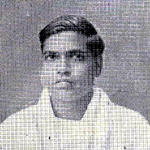 In October last while at
In October last while at
At Jaffna Hindu Vanniasingam was a prodigy of Tami learning. There were one or two occasions when his teacher was embarrassed by his profound knowledge of the language. We of his class then came to know that he knew more than his teacher. This discovery naturally made us his admirers. There were some among the students who were better writers and speakers by the prevailing standards of the College Literary Association. But they did not possess that elegance and style of Vanniasingam. His was Tamil pure and undefiled,. modern and yet with a classical touch. Coming from an orthodox Hindu family steeped in the traditions of the ancestral religion his approach to Tamil was that of a devotee and his attachment fixed and fervid. His dress was often dowdy but his speech was always sincere. His manner and mannerisms reflected tellingly his firm faith in the Faith of his forbears. No one was surprised at the distinction – marks he obtained in the Tamil papers of the Cambridge Senior. If there had been a paper on Hinduism he would certainly have astonished his examiners.
At Union Hostel we discerned another facet of his character – his skill as a debator. He regularly took part in the customary debates of the Hostel Society and always participated in the discussion connected with the ‘political’ of the place which invariably centred on the forceful personality of the Warden. Whenever he spoke and whatever the subject Vanniasingam’s remarks were characterized by a serious minded attitude somewhat uncommon for his age group. He always employed arguments more subtle than what the audience was generally used to. His masterly grasp of details aided by a powerful memory reflected the lawyer in him. Besides, he showed a contemptuous disregard of both applause and derision. On one occasion his hecklers had come prepared – ‘footed’ with clogs that made a repulsive noise on the wooden floor of Arunachalam Hall. Those less tenacious either shortened their speeches or did not venture to address the gathering. Vanniasingam was different. He ventured, persisted and finished his speech. By this he almost persuaded his opponents. Such was his method then and therafter throughout his parliamentary period. He spoke with conviction and felt he could finally convince others. In the House of Representatives he addressed his colleagues for twelve years 90% of whom were unsympathetic to his view. They could not subscribe to his policy but were thankful to him for its exposition.
With his deep love of Hinduism and fondness for the study of philosophy, he showed, during the period at the Union Hostel, no particular partiality for politics, though an admirer of Mahatma Gandhi and his anti-imperialistic activities. We thought that he would follow in the footsteps of his father and earn a name and fame as a civil lawyer. He did embark upon a legal career and was assured of success and renown. But Destiny dragged him elsewhere. The profession could never claim him fully. The controversies of the Pre-Independence period distracted him from his profession. Later the problems which
The qualities that characterized his political career were in fact latent during his University days. He was too honest to be purchased with a portifolio and too courageous to be overawed or intimidated either intellectually or physically. ‘He was of noble birth, valiant and virtuous, full of haughty courage.’ In him there was no divergence between precept and practice. His performance matched his promise. His love of Tamil was deep, passionate and profound. His Gandhism was not a matter of tactics but a part of his religion. There was no disharmony between his politics and philosophy. Thus he saw clearly and saw well. Politics took him away from law and now death has taken him away from politics. Yet the memory of his sterling qualities and self sacrificing institincst Death cannot efface among the present generation suffering from a woeful insufficiency of such men of character as he.
When one surveys his life as detachedly as is possible to a class-mate and contemporary, one cannot fail to notice the striking similarity it bears with that of a well-known figure in English politics – Sir Stafford Cripps. What Christianity and Socialism were to him, Hinduism and Federalism were to Vanniasingam. How aptly this tribute that was paid to Cripps by Winston Churchill applies to Vanniasingam – “His intellectual and moral passions were so strong that they not only inspired but not seldom dominated his actions. They were strengthened and also governed by the workings of a powerful lucid intelligence, and by a deep and lively . . . Faith. He strode through life with a remarkable indifference to material satisfactions or worldly advantages. I suppose there are few hon-members in any part of the House who have not differed violently from him at this time or that, and yet thereis none who did not regard him with respect and with admiration, not only for his abilities but for his character… It is not for me, in these few words, to attempt to epitomise the place which he will bear in the history of our life and times, or of his contribution to their political philosophy; but that, as a man, he had few his equals in ability or virtue will be generally affirmed by his contemporaries; and that he brought an unfailing flow of courage, honour and faith to bear upon our toils and torments will be attested by all who knew him and most of all by those who knew him best.”
(C. Vanniasingam was born on 13.10.1911. His father V. Coomaraswamy was a Proctor and Tamil scholar from Tellippalai. Vanniasingam was educated at Mahajana College, Tellippalai and






